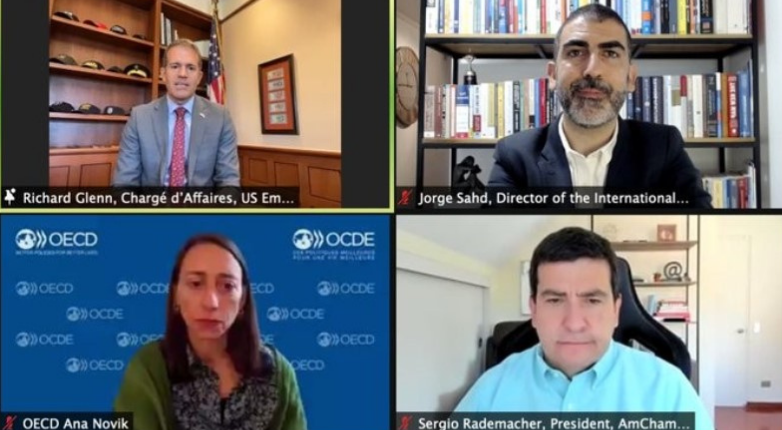When Does Foreign Direct Investment Pose a Risk to the Country?

The Santiago Center partnered with the Chilean-American Chamber of Commerce (AmCham Chile) and the US Embassy in Chile, in an event to review how the United States screens foreign direct investment (FDI) to ensure that such investment does not represent a security risk for the country.
The webinar, “The FDI Screening Process in the United States,” was presented by Kellen Ray, Policy Advisor at the US Department of the Treasury’s Office of Investment Security; Sarah Bauerle Danzman, Professor of International Studies at Indiana University; Ana Novik (SIPA’99), Head of the Investment Division at the Organization for Economic Co-operation and Development (OECD); and Jorge Sahd, Director of Universidad Católica’s Center for International Studies. The event was opened by Richard Glenn, Chargé d'Affaires at the US Embassy in Chile, and chaired by Paula Estévez (SEAS’06), CEO of AmCham Chile.
FDI can play a critical, positive role in a country's development, but some investment can threaten national security, particularly when it comes to investment in strategic sectors, said the US Embassy’s Glenn.
The US Department of the Treasury’s Ray highlighted the role that the Committee on Foreign Investment in the US (CFIUS) plays in evaluating national security risk. CFUIS is an interagency committee that focuses solely on national security risk, where “each transaction is reviewed on a case-by-case basis... with mitigation when warranted and possible,” he said.
In turn, Indiana University’s Bauerle Danzman emphasized that FDI in Latin America is largely in extractive and critical infrastructure, and any investment screening mechanism should be focused on those industries. FDI reached US$ 87.6 billion in the region in 2020, and the US is by far the largest FDI investor in Latin America, followed by Europe, she noted.
Universidad Católica’s Sahd reviewed the cases for attracting FDI to countries and called on the region to implement more stringent measures to evaluate those investments, particularly regarding from whom the investments are coming.
Countries are always looking for more foreign investment, but it is now normal in OECD countries to review those investments are more prone to review, added OECD’s Novik. She outlined the key OECD principles defined in 2009 guidelines for recipient country investment policy related to national security:
- Non-discrimination
- Transparency
- Regulatory proportionality
- Accountability